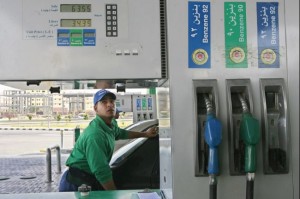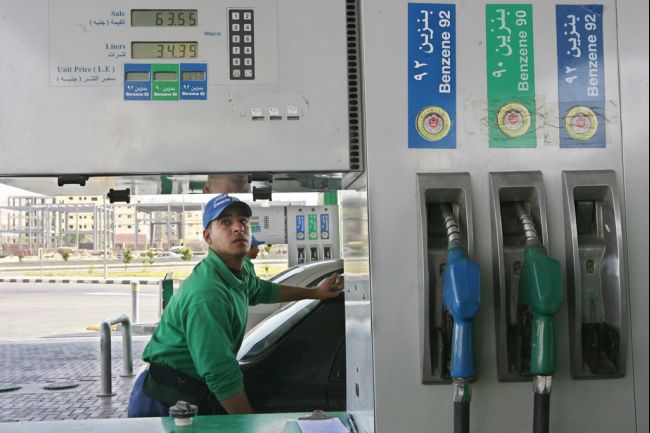
(AFP Photo)
The government is fighting energy smuggling through the distribution of smartcards in the first phase of its energy subsidies plan, Minister of Finance Ahmed Galal told the Daily News Egypt Monday, with the second phase of the plan to be implemented over several years.
The energy shortage remains a recurring problem and an issue of concern for industrial companies as well as the public, however.
Bruno Carre, general manager of Suez Cement, meanwhile said the main challenge the company is facing in the Egyptian market is to find an energy source and continue their normal operations.
“We have offered solutions, entered into discussions with the authorities with the hope that through good dialogue and exchange of information, we might be able to look forward [to operating in the market],” Carré said on 6 November.
Earlier last month, the Titan Cement Company’s executive vice president Medhat Stephanos also said that cement factories have reduced distribution and cut production by an average of 24% on the back of low and intermittent natural gas supply.
“The oil subsidy is an issue that must be resolved or at least rationalised,” former minister of petroleum Abdullah Ghorab told the Daily News Egypt.
“There are several suggestions that were made by cement companies such as the use of coal, however, the Ministry of Environmental Affairs has been rejecting these offers because coal is very harmful for the environment,” said Mohammed Al-Sukari, professor and researcher at the Egyptian Petroleum Research Institute.
“Egyptian authorities are studying various options such as the use of garbage, for example but it is a complicated matter,” he said.
“Gas stills exists, especially in the Mediterranean Sea, but the cost of exploration and extraction is massive,” Al-Sukari said. “We need foreign investments.”
“We have neither the technology nor the capabilities to extract the gas from the marine areas and foreign companies require political stability to make such investments, around EGP 5 or 6 bn,” Al-Sukari added.
The petroleum researcher said that the debts to foreign companies are another issue that further complicates the energy dilemma in Egypt.
Oil production companies, however, were more optimistic after the Egyptian government made several promises that they would pay their debts.
“We have been given strong indications by the Egyptian government regarding planned payments in the next few months,” Patrick Allman-Ward, Chief Executive Officer of Dana Gas, said in a statement issued by the company on 4 November. “We welcome this positive step as it will allow our capital and exploration expenditure to remain in-line with anticipated spending plans, allowing us to pursue our strategy of maximising our production from these resources.”
On how to attract foreign investments, Ghorab said that Egypt remains a promising country when it comes to petroleum and oil production. “We just need to change our functioning mechanism and become more open minded to new options,” he said.
“The Egyptian General Petroleum Corporation (EGPC) sells the petroleum products to the government with a 80% price reduction and the government then sells it to the public,” Ghorab said adding that “This is the energy subsidy so while the EGPC makes investments with the regular oil prices they are forced to sell it at a much reduced price and that is where the debt to foreign companies come from.”
On 31 October, Sherif Ismail, the minister of petroleum signed nine agreements in the natural gas and oil exploration field with $470m in investments. The agreements authorise exploration for petroleum products in Sinai, the Gulf of Suez and the Western and Nubian deserts. They were signed with Shell, BICO, Greystone, Petzed and the Egyptian General Petroleum Corporation (EGPC)
“There is a growing interest by international companies to work in Egypt because of its economic feasibility and petroleum prospects,” Ismail said.
On 12 November, the Ministry of Electricity and Energy (MOEE) announced the completion of the registration of the hydroelectric power plant in Assiut to the Clean Development Mechanism (CDM). Minister of Electricity and Energy Ahmed Emam said the power plant will produce 32MW of electricity and start operations in 2016.
The minister made several announcements during the last five months in a firm attempt to minimise the power outages and continue with the set five year plan. The latest announcement was on 6 November with the ministry announcing the start of a new electrical-wind energy project in Jebel Ali area, expected to start operating next year. According to Emam, the project, which costs around EGP 2bn, will generate 200 MW of electricity.
The minister added that there are a number of projects that are being prepared and studied by the ministry, projects which he said would generate 1940 MW and be achieved in cooperation with Japan, Spain, Germany, the European Investment Bank, the European Union and the French Development Agency. The minister noted there would be additional projects, which will provide 970 MW of energy, to be carried out by the private sector in the Gulf of Suez.
The ministry also announced a regional control centre project to be built in the Nile Delta. In an official statement issued by the ministry earlier last month, Emam said that the Delta project is geared towards the safe and economic production of 66 KV of electricity and aims to lessen the power pressure and cut the number of outages, as well as assisting in locating and tracking the areas experiencing power cuts.
Another current project is the Southern Helwan power station, a part of the 2012/2017 five year plan, which will be financed by the fund for the Organization of the Petroleum Exporting Countries (OPEC), among other sources, including the World Bank. The total cost to finance this project is EGP14bn, or around $2bn.




